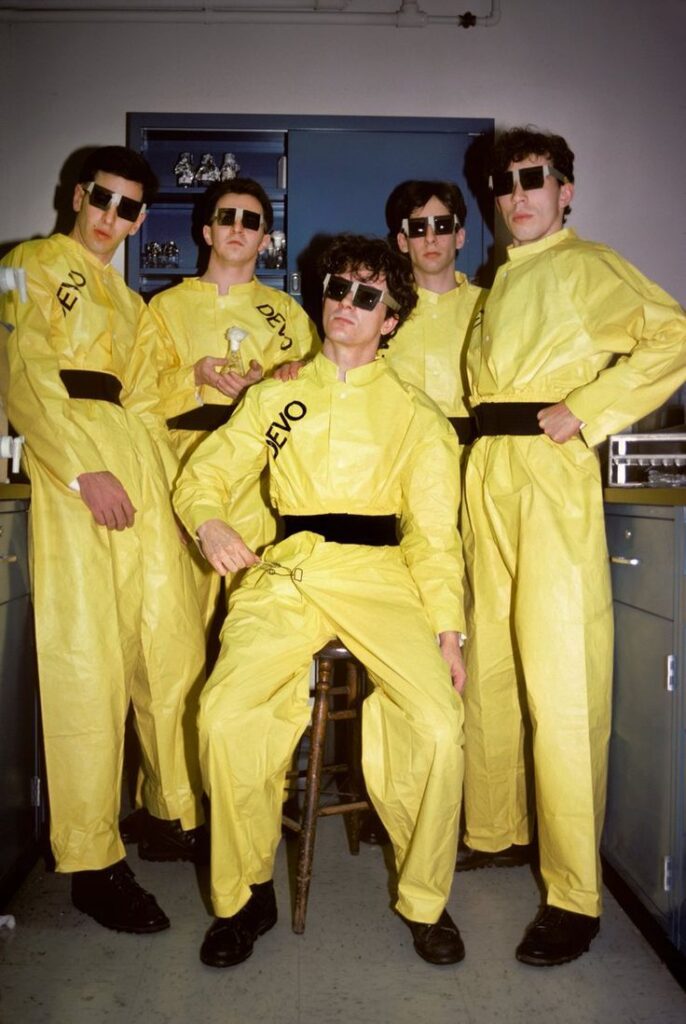
Jerky Rhythms and Primitive Panic: The Sound of Society’s Decline
An anxious, driving anthem about the raw, irrational impulses that subvert civilization’s veneer.
In the late 1970s, as the polished sheen of disco faded and the earnest fury of punk rock began to fragment, something strange yet utterly compelling emerged from Akron, Ohio: the sound and philosophy of Devo. Their mission was simple, yet subversive—to prove the theory of “de-evolution,” the idea that humanity was not advancing, but regressing. No song captured the frantic energy and underlying social satire of their early work better than “Uncontrollable Urge,” the opening track from their monumental 1978 debut album, Q: Are We Not Men? A: We Are Devo!
The album itself, an astonishing work of angular New Wave and art punk produced by the visionary Brian Eno, was a landmark, reaching #78 on the U.S. Billboard chart and a more respectable #2 on the UK Albums chart. However, “Uncontrollable Urge” was never formally released as a single on its own, instead often appearing as the B-side to their famously jarring cover of The Rolling Stones’ “(I Can’t Get No) Satisfaction” in certain territories in 1978. Thus, it didn’t register a chart position in its own right, yet its inclusion as the relentless opening salvo set the uncompromising tone for the whole Devo manifesto.
The story behind the song is inseparable from the band’s core philosophy. Written by Mark Mothersbaugh, the track is a primal scream wrapped in an unsettlingly mechanical beat. It embodies the theme of de-evolution by focusing on the failure of modern, “evolved” man to control his most basic, animalistic drives. The relentless, jerky rhythm and the shouted, repetitive vocals (“Got an urge / Got a surge / And it’s outta control!”) perfectly mimic the frantic, almost agonizing feeling of a deep, biological need taking over.
For listeners in the late seventies—many of whom were beginning to feel stifled by the conformity and rigid expectations of post-war American society—the song’s meaning resonated profoundly. While some interpretations, often tongue-in-cheek, linked the urge directly to masturbation, the band’s co-founder, Gerald Casale, stated that it was their foundational “mission statement.” It was a commentary on the absurdity of humanity’s self-important stories about its purpose and origins. “Uncontrollable Urge” is a satirical, yet deeply felt, expression of humanity reduced to an instinctual organism, utterly disconnected from logic, reason, or genuine societal satisfaction. The song argues that when we repress or fail to understand our fundamental, chaotic impulses, we don’t become more sophisticated; we merely become more awkward, repressed, and ultimately, less human.
Listening to it now, that nervous, almost paranoid energy is what truly brings the memories flooding back. It wasn’t just music; it was a cultural shift. The stiff, mechanical performances, the cheap-looking, futuristic jumpsuits, and the bizarre, almost Dadaist sensibility felt like a jolt of cold water—a shocking but necessary wake-up call to anyone who felt the world had gotten a little too complacent. It’s the soundtrack to a collective, subconscious anxiety, brilliantly disguised as a hyper-kinetic dance number. The song reminds us of a time when the future seemed uncertain, and Devo was there, not to reassure us, but to gleefully confirm our darkest suspicions: we might all be headed backward, but at least we could dance about it with an “Uncontrollable Urge.”